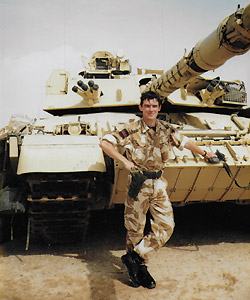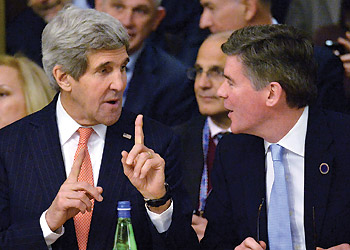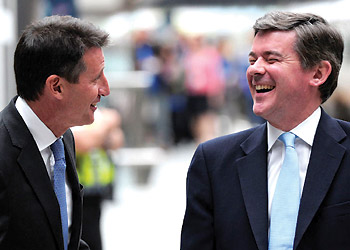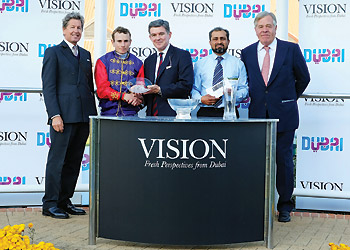|
AN INTERVIEW WITH THE RIGHT HONOURABLE SIR HUGH ROBERTSON KCMG DL
formerly The Life Guards
by The Editor
|
This interview is the first of a regular series in The Guards Magazine, in which former Guardsmen are invited to talk about their time in the Household Division and how this has influenced their later career. Sir Hugh Robertson, who served in The Life Guards for 10 years before moving on to the City in 1995 and then politics a few years later, is the first of hopefully many former distinguished Guardsmen who will submit themselves to the pages of this magazine! As Hugh wrote in his response to the Major General’s invitation to be interviewed, ‘nothing that I have done in my life has been more influential than my time in the Household Division’, a sentiment that will be shared by many.
 Captain Hugh Robertson - in the Gulf, 1991
Captain Hugh Robertson - in the Gulf, 1991 |
 US Secretary of State John Kerry with Sir Hugh Robertson during the Conference on International Support to Libya, held in Rome. 6th March 2014
US Secretary of State John Kerry with Sir Hugh Robertson during the Conference on International Support to Libya, held in Rome. 6th March 2014 |
As the interviewer, I should declare my hand by saying that I have known Hugh Robertson for a long time, over 30 years, and our meeting was as much a convivial chat between old friends as it was an interview. I recall Hugh as a young subaltern in Windsor in the mid-80s, later as an ADC, and most notably as Adjutant in Germany, during those frenetic days following the Iraqi invasion of Kuwait on 2nd August 1990, the day that old style, predictable BAOR soldiering ended - for ever. I remember our first ‘O’ Group that followed, with Hugh calmly taking notes while the Commanding Officer recounted a conversation with another Guardsman who worked in Military Operations in London. ‘We are reforming 4th Guards Brigade and will be deploying to war on the Berlin to Baghdad railway’. I think we all laughed, perhaps some of us more nervously than others, before scurrying back to our offices to check the rail timetable.
There followed a few weeks of considerable uncertainty, and when decisions began to be made, it seemed that The Life Guards would not be going to the Gulf, at least not as a regiment. Instead, and rather alarmingly, most of our vehicles were to be cannibalised for spares or handed-over to armoured regiments that were deploying. It was an unsettling time and, with ‘rumour control’ running amok, I remember one day casually dropping into Hugh’s office to ask him what was actually going on. ‘I think ... you will find, that we are all going to war ... sooner or later’. It was a good answer to a rather silly question, and if Hugh was mildly irritated, he did not show it. Assume the worst (or the best, whichever one’s inclination), and plan for it. Hugh might not remember this short exchange, across a busy Adjutant’s desk piled high with files, but I do.
Hugh Robertson joined the Army in 1985, following King’s School Canterbury and Reading University. With no family links, his reasons for joining were much the same as many others in their twenties: the opportunity for some excitement and a desire to travel. Having considered several regiments, it was at Sandhurst that he realised that there was something special and different about the Household Division. He was particularly taken by the Household Cavalry, which matched his interests and aspirations, with its reconnaissance role in 5 Airborne Brigade and 3 Commando Brigade. Following an interview at Horse Guards with the Lieutenant Colonel Commanding (during which ‘cricket’ was one of the subjects discussed - a very civilised diversion), Hugh was offered a commission in The Life Guards. There followed 18 months as a troop leader in Windsor, including the Troop Leaders’ Course at Bovington along with six other Household Cavalrymen students - all eager to prove they were better and smarter than the other Royal Armoured Corps students. Hugh learnt early in his career that the Household Division set a high bar in all that it did - so that ‘striving for excellence’ really did mean something.
In October 1986, the Commanding Officer of 2nd Battalion Grenadier Guards, on a Northern Ireland operational tour based in Ballykinler, offered an attachment for a Household Cavalry officer. Hugh was selected, and it was an opportunity not to be missed: six months as a platoon commander. It was a memorable experience, something that proved invaluable when Hugh later became the Major General’s ADC at Horse Guards, and not least because the Grenadiers ‘epitomized everything that is special about the Household Division’.
Looking back on his Army career, Hugh could not recall any really bad times, although there were certainly difficult periods like the 1st Gulf War, when The Life Guards was deployed in a piecemeal manner with Regimental Headquarters divorced from its own sub-units. Hugh also remembers the happy and enjoyable period that followed, back in Germany, when the Regiment reformed, trained hard, played plenty of sport, and had some fun. There were other high points: as ADC to Major General Sir Simon Cooper, both in London and later at Sandhurst; commanding the Household Cavalry on the Queen’s Birthday Parade in 1993, and the British UN detachment during the siege of Sarajevo in 1994.
Hugh left the Army in 1995, when he joined Schroders in the investment management division. In the meantime, his interest in politics steadily evolved, and perhaps the genesis of this calling goes back to his time as a platoon commander in Northern Ireland. The Army, he says, tends to be very good at ‘managing the situation rather than solving it’, while real change relies on politics and, of course, politicians. As we discussed this, Hugh speculated about how his life might have panned out had he ‘been a young Catholic’ in the Bogside in the mid-80s rather than an Army officer. Who knows, he said, but he can understand what some of his motivations might have been. This prompted me to ask a rather obvious question: had he met the late Martin McGuinness, perhaps when they were both politicians? No was the answer, but it turns out that he did meet his brother, Willie, back in 1987. Many years later, by now an MP, Hugh was asked to pose three questions for a House of Commons quiz: ‘Who has ridden on a horse on a state occasion; arrested Martin McGuinness’s brother; and met warlords in Beirut?’ It was, of course, Hugh, and although he never met Willie’s brother, he agreed that they had at least one thing in common: an understanding that only politics can bring about profound change for the better in people’s lives.
In 2001, and now on the list of approved candidates, Hugh was given the opportunity to contest the Faversham and Mid Kent constituency for the Conservatives, the previous MP having stood down before the General Election. 2001 proved to be a good year: Hugh was elected with a majority of over 4000 in a county he knew well, and he met Anna Copson, who was to become his wife the following year.
Hugh soon found himself in the Whips’ office, which reminded him of the Regimental Orderly Room, not surprising perhaps, since quite a few former Guardsmen had begun their political careers in the same place. Both the Army and politics are fundamentally about people, and Hugh was able to draw on his military experience when he became Shadow Sports Minister in 2004, a portfolio that was extended to the Olympics the following year, and one that he was to continue as a Minister of State following the 2010 election. Working out what was important, assimilating and assessing information, never losing focus, and being organised; these were all qualities that Hugh had developed
in the Army.
Another important lesson that the Army taught Hugh was the importance of getting out of the office and ‘walking the floors’, something that every good commander and staff officer should do on Day 1 and perhaps not something that comes naturally to all politicians. Hugh found this to be invaluable at the Foreign Office when he moved there in 2013 as Minister of State with responsibility for The Middle East, North Africa and Counter Terrorism. Also, working for William Hague was ‘a real privilege in the best traditions of the Household Division’; he was always absolutely clear in his direction to his subordinates, without losing his dry sense of humour. When Hugh was called into the Foreign Secretary’s office for a chat after some time in the job (a kind of informal performance appraisal), William Hague began by asking him ‘Just tell me one country in your portfolio that has actually got better since you arrived?’ Following a long pause as Hugh mentally ran through the list, the answer came back: ‘Tunisia’.
Being involved in the Olympics was a particularly high point in Hugh’s political career, and he remains immensely proud of the important role he played in delivering the London Olympics in 2012. As Seb Coe said to him after it was all over, ‘When we are 75 people will still remember London 2012’ - a real achievement for all those involved.
 Sir Hugh Robertson with Lord Coe
Sir Hugh Robertson with Lord Coe |
 The Dubai Future Champions Festival at Newmarket. 9th October 2015. Sir Hugh Robertson presenting the prize to the winning jockey, RL Moore, who had just won the Vision Old Rowley Cup on HM The Queen’s horse, Mustard. On the left, John Warren, The Queen’s racing manager, and on the right, The Queen’s trainer, Sir Michael Stoute
The Dubai Future Champions Festival at Newmarket. 9th October 2015. Sir Hugh Robertson presenting the prize to the winning jockey, RL Moore, who had just won the Vision Old Rowley Cup on HM The Queen’s horse, Mustard. On the left, John Warren, The Queen’s racing manager, and on the right, The Queen’s trainer, Sir Michael Stoute |
Hugh stood down from government in the 2014 reshuffle and was knighted for his work on the London 2012 Olympics and in The Middle East. In 2015, he retired as an MP, having increased his majority to over 17,000 in the 2010 Election. When we met in mid-April, it was just a day after Theresa May had called the 2017 General Election, and so I asked Hugh the predictable question: any regrets - would he like to be back in politics, on the campaign trail for the next six weeks, or was he happy to be watching from the side-lines? ‘A bit of both’ came the reply. There had been a few low-points, like receiving razor blades through his letterbox during the passage of the Hunting Bill in 2004 (when he was a shadow minister), and the intimidation both he and his family received when he steered the ‘Marriage (Same Sex Couples) Bill’ through Parliament in 2013; but on balance he would not have missed the privilege of being a Member of Parliament and a Minister of State for anything.
Hugh is proud of his time in politics, but now very happy to be Vice Chairman, International Relations for Falcon and Associates, a strategic advisory group working on behalf of the Leadership of Dubai. One of the real benefits is that he sees more of his family while still finding time to be Chairman of The British Olympic Association, Chairman of The Canterbury Cathedral Appeal, and a Deputy Lieutenant of Kent.
Hugh attributes most of his achievements so far (aged 54!) to his time in the Household Division. On a personal level, this has endowed him with ‘proper friends for life’ with a shared experience that means they will always be there, dependable as ever. Hugh is also reminded of something that Harold Macmillan, a Grenadier during the First World War, said about his time as a Guardsman: ‘the only tolerable form of soldiering, because they [the Guards] always had a view that if anything was done, it must be done as well as possible...’ Macmillan also said that for once in one’s life it is good to be part of something that is really first class - and Hugh Robertson agrees. |
|




